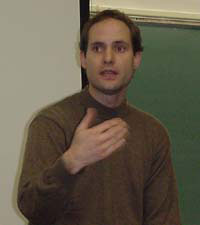Doctors Without Borders Provide Health Care Where None Exists
Imagine setting up a hospital in a place where there is no heat, no running water, no food. It's a formidable task.
That's exactly the job of Nobel Peace Prize-winning Doctors Without Borders or Médecins Sans Frontières (MSF).
Doctors Without Borders is a cutting edge organization dedicated to international health founded in 1971 by a small group of French doctors who believed that all people have the right to medical care. They also believed that the needs of these people supersede respect for national borders. It was the first non-governmental organization to both provide emergency medical assistance and publicly bear witness to the plight of the populations they served.
Chris Sauer, former volunteer for Doctors Without Borders, spoke about the organization at an event on December 7th sponsored by the Department of Health and Behavioral Studies.
The private, nonprofit organization helps people who need emergency health care and care for populations suffering from endemic diseases and neglect. The volunteers provide: primary health care, performs surgery, rehabilitates hospitals and clinics, runs nutrition and sanitation programs, trains local medical personnel, and provides mental health care.
When the organization hears about something happening, they move quickly into that area. The volunteers are armed with kits, which are small enough to fit into a plane, which will turn into centers that can help people with specific diseases or sick people in general. One of these kits turns into a fully operational center that can help 25 patients a day.
These kits that cover everything from vaccinations to cholera are in a catalog that the volunteers get to know very well. The only problem is that they are never certain of the price or the availability. Supplies could change quickly.
Feeding the hungry is as challenging as helping the sick. The volunteers have to make sure that they know who is eating the food that is given out. Otherwise, it could get stolen or go to people who don't need it as much. Some people steal the food biscuits to make beer from them.
"Food drops don't work, you don't know who is getting the food," said Sauer. "Often the camp where the food is dropped will be raided."
Through longer-term programs, Doctors Without Borders treats chronic diseases such as tuberculosis, malaria, sleeping sickness, and AIDS; assists with the medical and psychological problems of marginalized populations including street children and ethnic minorities; and brings health care to remote, isolated areas where resources and training are limited. Right now their volunteers-from doctors to nurses to engineers-are in 30 countries.
"Usually we are the first people to go in and the last to leave," said Sauer. "Good healthcare is hard to come by in most of the world and we end up sticking around."
For more information on Doctors Without Borders, please visit their Web site, www.doctorswithoutborders.org.
Published Monday, May. 20, 2002
